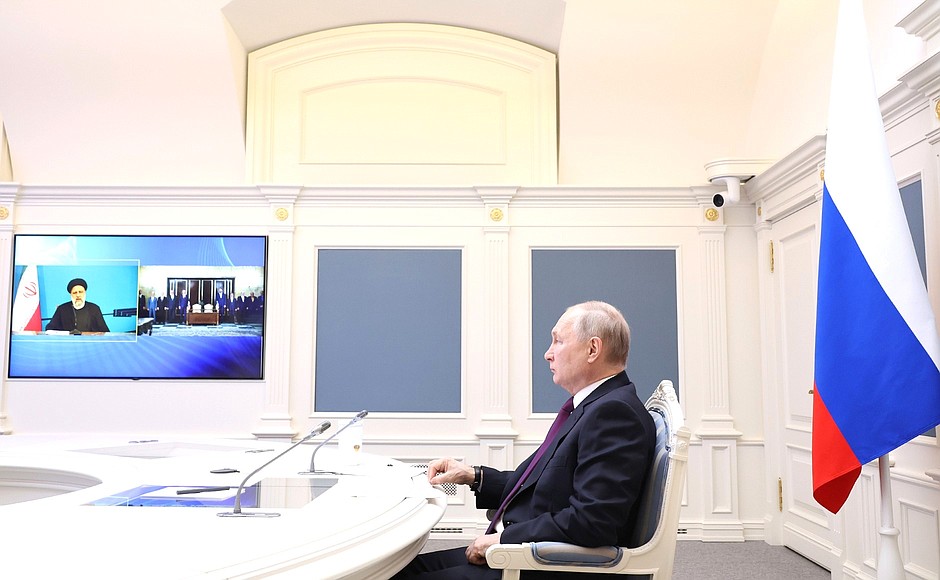Iranian and Russian officials have signed an agreement on the long-stalled construction of a railway connecting the cities of Astara and Rasht in Iran.
According to the document, Russia will invest €1.6 billion in this railway route which is set to be completed in 48 months. Moscow and Tehran will jointly finance designing, construction, as well as supplies of goods and services, the Iranian president’s website reported on May 17.
The North-South International Transport Corridor (ITC) connects Russia with the countries of the Caspian basin, the Persian Gulf, Central, South and Southeast Asia. The western route of the corridor, which includes Russia, Iran and Azerbaijan, had a missing link of 162 kilometres between Rasht and Astara.
It is planned that the Rasht-Astara line will be built by Moscow and Tehran, while the Astara (Iran) - Astara (Azerbaijan) line will be constructed by Moscow, Tehran, and Baku. Earlier, a railway line was built in Azerbaijan connecting the Azerbaijani and Iranian Astara across the Astarachay River.
Through the signing of this agreement, Southern Asia will be connected to Northern Europe, and it will also boost the economic efficiency of the trans-Caspian route.
Iran's Roads Minister Mehrdad Bazrpash and the visiting Russian Transport Minister Vitaliy Savelyev signed the deal, while Iranian President Ebrahim Raisi and his Russian counterpart Vladimir Putin joined the signing ceremony via video link.
Addressing the ceremony, the Iranian president said that "this route will connect from Eastern and Southern Asia to the Caucasus and Northern Europe and will be a manifestation of commercial and economic cooperation and convergence between all these countries, and this cooperation will be further developed".
"Strengthening the route between Pakistan, Iran and Turkey, the Shalamcheh-Basra railway, as well as the Chabahar-Zahedan railway, connecting the Oman Sea and the Persian Gulf to Europe, and completing the North-South Corridor are among the defined packages to strengthen Iran's transit position, which will be followed up seriously," Raisi added.
For his turn, the Russian president said at the ceremony that the Rasht-Astara railway section will enable the diversification of transportation routes for goods, as well as reduce the time and cost of their delivery.
"This unique North-South transport artery, the Rasht-Astara railway, will become a part of and will help to significantly diversify global [cargo] traffic flows. Transportation along the new corridor will offer significant competitive advantages," Putin said.
He noted earlier that the project is interesting not only to Russia and Iran, but also to all participants of global trade as from the viewpoint of logistics this will be a considerable addition to the Suez Canal and Black Sea straits.
Russian Deputy Prime Minister Alexander Novak who is paying a working visit to Iran, said that "Agreements were reached today on the implementation of the western route with a capacity of 15 million tons by 2030. The potential capacity of this transport [North-South] corridor will definitely expand. It could be 30 or 60 million tons, as trade will only increase, connecting the western parts of the Eurasian continent with the eastern part, creating opportunities for alternative transport corridors," the official said.
He noted that last year the total volume of cargo turnover between the two countries amounted to about 5 million tons, taking into account road transport and other routes.
A vital element of the INSTC, the Rasht-Astara railway project in the northern province of Gilan, has been stalled for 23 years due to costs, engineering, and logistical complications. Iran's Supreme Leader Ayatollah Ali Khamenei stressed the importance of completing the stretch of the railway in his July 2022 meeting with Putin in Tehran.







 The Mine Action Agency of Azerbaijan (ANAMA) reported on Thursday the discovery of a significant amount of explosives in the Khojavand district of ...
The Mine Action Agency of Azerbaijan (ANAMA) reported on Thursday the discovery of a significant amount of explosives in the Khojavand district of ...
 Iran has refuted reports of alleged damage to Shimon Peres Negev Nuclear Research Centre located southeast of Dimona, Israel, during the recent air...
Iran has refuted reports of alleged damage to Shimon Peres Negev Nuclear Research Centre located southeast of Dimona, Israel, during the recent air...
 Iran’s Foreign Minister, Hossein Amir-Abdollahian, has labeled a foiled Israeli drone attack in certain parts of the country as a "failure" for Isr...
Iran’s Foreign Minister, Hossein Amir-Abdollahian, has labeled a foiled Israeli drone attack in certain parts of the country as a "failure" for Isr...



